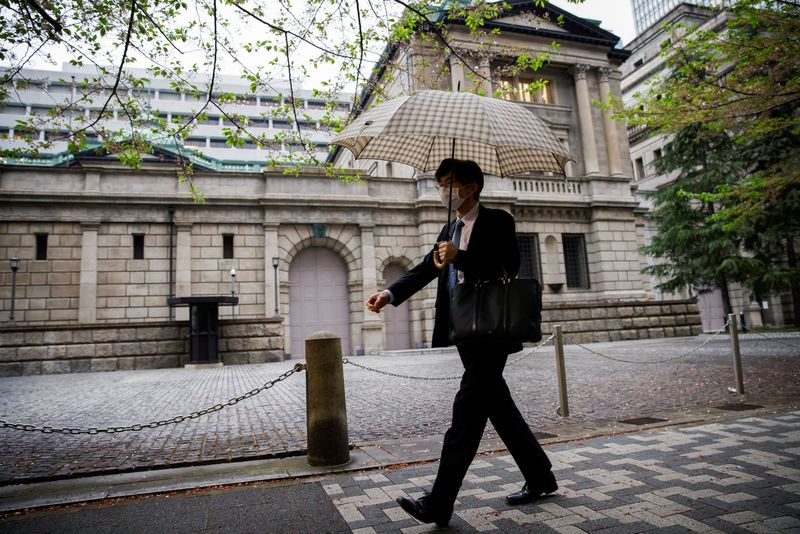By Kantaro Komiya
TOKYO (Reuters) – The Bank of Japan (BOJ) will likely maintain its yield curve control (YCC) policy until at least next year, three quarters of economists polled by Reuters said, as expectations for a near-term policy shift by new governor Kazuo Ueda subside.
At his first policy meeting in April, Ueda kept the central bank’s ultra-low rates unchanged citing a lack of confidence about the outlook for its 2% inflation target’s achievement and announced a “broad-perspective review” of past policies.
In the poll, however, more than half of the analysts expected the BOJ to start unwinding its easing scheme by end-July, with measures such as widening the yield cap or shortening the target maturity to mitigate YCC’s side-effects.
Only six of 24 economists, or 25%, said the BOJ will end YCC this year, the May 17-24 poll showed, much lower than 56% in an April poll. Five (21%) projected it to happen in the first half of 2024, six (25%) opted for the latter half of 2024 and another five chose “2025 or later”.
“With rising uncertainties around the global economy, the risks accompanied with a drastic policy shift are not small,” said Takumi Tsunoda, senior economist at Shinkin Central Bank Research Institute. Tsunoda expected the BOJ to fine-tune YCC to fix bond market distortions and sustain the policy until early 2024.
Two economists (8%) even chose “BOJ will not end YCC” – an option none selected in April and March polls.
YCC “will remain as a safeguard against yields potentially overshooting” during the BOJ’s multi-year normalisation process from quantitative easing, said Oxford Economics’ Senior Japan Economist Norihiro Yamaguchi.
‘JULY COULD BE LAST CHANCE’
Meanwhile, 10 of 24 economists (42%) said the BOJ will start scaling back its ultra-easy policy in July, followed by four (17%) who expected the shift even earlier in June.
“July could be the last chance before the U.S. economy may head to a recession later this year, which makes it difficult for the BOJ to revise YCC”, said Nobuyasu Atago, chief economist at Ichiyoshi Securities.
Asked about what the BOJ would do if it were to modify YCC before – or instead of – ending it, 57% of economists forecast a widening of the tolerance range around the 10-year yield target, while 43% chose a change of the control target to a shorter-term bond yield.
A higher percentage of respondents expected the former option this time compared to last month.
Economists’ forecasts on the timing of the end of the BOJ’s negative short-term interest rate policy were largely unchanged from the April poll, with 38% expecting it to happen in the second half of 2024 and 42% projected it in 2025 or later.
A desirable timing to dismantle the negative rate policy would be after the conclusion of the “broad-perspective review”, which Ueda has said would take one to 1-1/2 years, as well as after the next U.S. rate cut cycle, said Mari Iwashita, chief market economist at Daiwa Securities.
Elsewhere in the poll, asked about the potential impact on the BOJ’s policy if the United States defaulted on the debt ceiling issues, 11 of 21 respondents (52%) expected a delay in the central bank’s roll-back of ultra-loose easing.
“If the U.S. default actually were to happen, the impact would be unfathomable – the BOJ, if not carrying out additional easing measures, must pause for a while to monitor how the events unfold,” said Ichiyoshi’s Atago.
(For other stories from the Reuters global long-term economic outlook polls package:)
(Reporting by Kantaro Komiya; Additional reporting by Satoshi Sugiyama; Polling by Veronica Khongwir and Anant Chandak; Editing by Sam Holmes)
